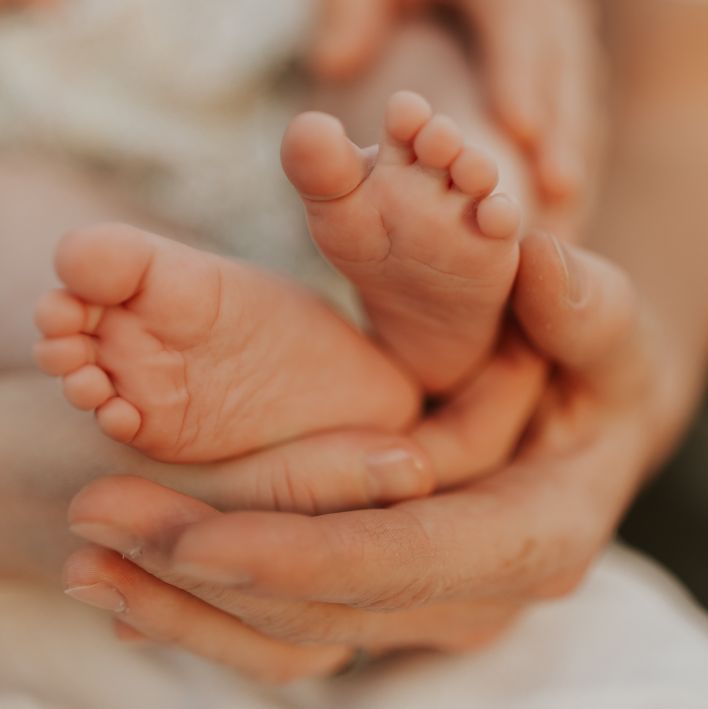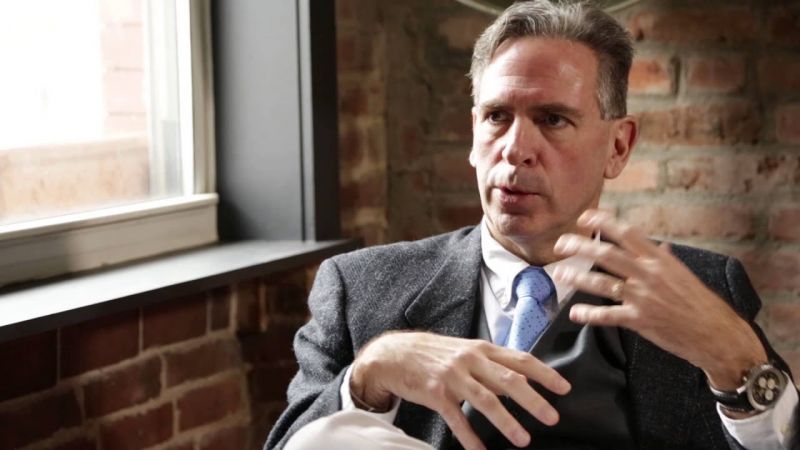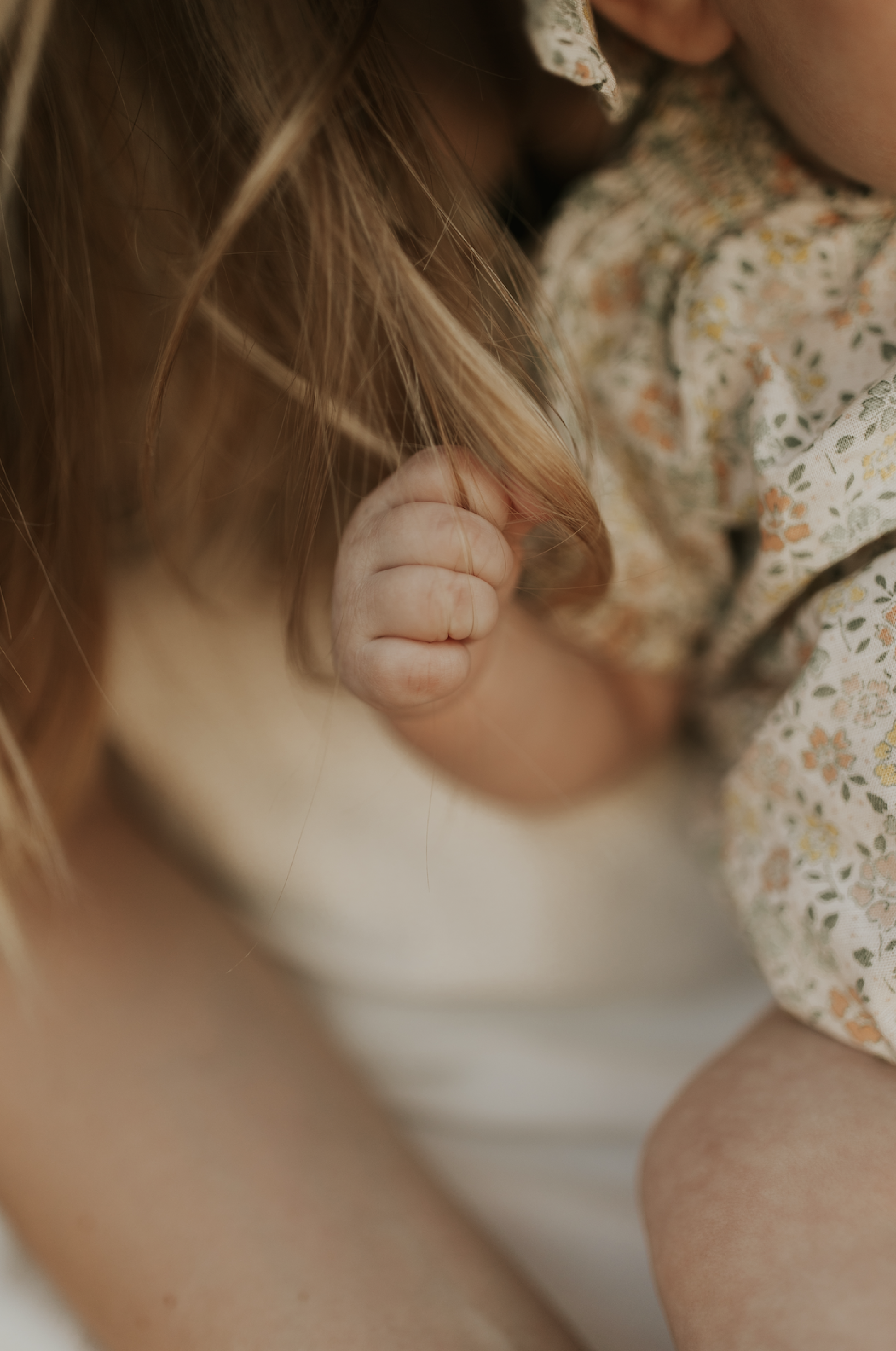Mother Or Monster: Inside My Secret Battle With Postpartum OCD
One mother’s journey through hell and back after suffering from taboo intrusive thoughts about her newborn.
Written by Briagenn Price

01 When Briagenn's daughter was first born, she suddenly began struggling with harm and pedophile intrusive thoughts. She had no idea what they meant.
02 After being hospitalized, she was surprised to receive an OCD diagnosis.
03 Now in recovery, she shares her story in hopes of helping other mothers.
Trigger warning: suicide, pedophilia intrusive thoughts, harm intrusive thoughts
When my daughter was six weeks old, I tried to kill myself.
Those words aren’t easy to write, and I’m sure they’re not easy to read. Why on earth would I choose to abandon my beloved newborn? The answer is one you wouldn’t suspect in a million years: postpartum OCD had convinced me that I was a pedophile.
It started the first time I gave my baby a bath. She was only a couple of days old, and her umbilical cord was still attached to her belly. As I dabbed a washcloth around the wound, I remembered a video I had seen years before.
It’s of Blake Lively giving a speech at a charity for children, advocating against child pornography. In the speech, she says that some explicit content features babies so small, their umbilical cords are still attached to their bodies.
“Oh my god,” I thought. “How could you even abuse a baby?”
Then, a second, incredibly scarier thought occurred, “What if I abuse my baby?”
Immediately, a hot wave of anxiety surged through me. I quickly finished my baby’s bath, trying to shake the intrusive thought from my mind. But it was so disturbing that it stuck. No matter what I did to distract myself, I couldn’t stop thinking about abusing my baby.

Dr. Phillipson Talks Science, Symptoms & Treatment of OCD
For the rest of the evening, my mind raced with horrifying what-ifs. “Did I just brush up against her diaper?” “How close are my hands to her crotch?” Even breastfeeding my daughter suddenly felt dirty. That night, I barely got any sleep.
When I woke up, I told my husband we needed to talk. I’ve always had anxiety, and he’s been my biggest support system. As I confessed the content of my intrusive thoughts, he assured me I was fine. “Don’t worry, B,” he said. “You’re not going to abuse her.”
But I wasn’t so sure.
The next few weeks were hell. I stopped changing my baby’s diapers, and I neglected to bathe her properly. Even buckling her seatbelt sent me into a panic. I was terrified that I’d act on some unwanted urge or impulse to abuse her. I couldn’t eat or sleep, so my milk started to dry up. But the intrusive thoughts didn’t stop. Instead, they intensified.
“What if I just killed her?” I thought. “Then this would all go away.”
Convinced I was a danger to my daughter, I refused to be alone with her. I feared I might go into psychosis. My husband had to take time off work to stay home, but even that support proved futile. Then, one night, a new thought came to mind: “Just kill yourself. That’s the only escape.”
From that moment on, I believed that I needed to die. That I deserved to die. That it was me or my baby — and the mother in me chose myself.
I’ll spare you the details of the day I tried to kill myself. It was a terrifying blur, but thankfully my mother-in-law saved my life. I got admitted to a mental health facility, and my husband rode with me in the ambulance, gripping my hand tightly. “B, you need to promise me,” he pleaded. “Don’t hurt yourself in there.” Reluctantly, I agreed.
I spent two weeks at the mental health facility, missing Christmas and New Year's with my family. My husband visited me as much as possible, but I never had good news to share. “It’s 24/7,” I told him. “I can’t stop thinking about abusing or killing our baby.”
I was seeing a psychiatrist, and due to my lack of sleep, she diagnosed me with bipolar disorder. But that didn’t feel right. I wasn’t manic — I was deeply, deeply depressed. Nevertheless, she put me on mood stabilizers, in addition to an SSRI. Every day was the same. She’d ask me, “How are you feeling?” and I’d reply, “Like I want to die.”
After a week of this, I met another doctor. An intern, actually. I told her my story, stopping every other sentence to sob. She looked at me — really looked at me, in a way the other psychiatrist never did. Then she said, “I think you’re suffering from OCD.”
Before that moment, I thought of OCD as the germaphobe, hand washing disease. I quickly learned, “OCD obsessions are lasting and unwanted thoughts that keep coming back…”
Suddenly, my entire life made sense. The sticky, scary thoughts I previously attributed to anxiety were actually OCD. My condition just hadn’t kicked into overdrive until postpartum, placing my newborn baby at the center of my obsessions. Feeling more hopeful, I was ready to go home.
Over the next month, I got a formal OCD diagnosis after taking the Yale-Brown Obsessive Compulsive Scale (Y-BOCS) assessment. I also saw a postpartum coach, and started therapy with an OCD specialist.
Still on maternity leave, I spent every second trying to bond with my baby. It was difficult to connect when I could barely kiss or cuddle her without intrusive thoughts invading my brain. I felt overwhelmingly guilty for not “loving” her properly. Every day was a challenge, and I often wondered if I would, in fact, be better off dead. But I clung to the promise I made my husband — I wouldn’t hurt myself, no matter what.
During that time, I read every recovery story I could find about postpartum OCD. I craved women’s stories of them going through hell and back, and I promised myself I’d write a story of my own if I got to the other side. It’s taken roughly 1.5 years, but I’m finally ready to open up.

On my worst days, I didn’t think there was a point in trying. What kind of mom thinks of doing such awful things? But I want to let you know that no matter how dark your situation may seem, there is a light at the end of the tunnel. Recovery from OCD is possible, and you can feel happy again. I love my baby more than anything. I would never, ever abuse her. I’m a good mom with a mental illness, that’s all.
Despite my debilitating experience with postpartum OCD, I want another baby one day. Only this time, I’ll be fully medicated (SSRIs are pregnancy-safe). I’ll also have my OCD specialist on speed dial. Finding a therapist ahead of time is something I'd recommend to all moms. There’s frequently a 2-3 month waitlist, which feels like forever when you’re in the throes of OCD. It’s always better to be proactive.
Suicide is a leading cause of maternal mortality and accounts for about 20% of postpartum deaths. I often wonder, how many moms like me are dying every day, secretly terrified that they’re monsters? Postpartum OCD is inherently taboo. Nobody wants to admit they’re thinking about abusing or killing their baby. Thankfully, my story didn’t end with suicide, and yours doesn’t have to either.
If you’re a mom struggling with postpartum OCD and intrusive thoughts, my inbox is open: [email protected]. Reach out if you need support. Together, we’ll get through this.
<>
ABOUT THE AUTHOR
Briagenn is a 30-year-old mother to one baby girl. She lives in Ohio with her husband and daughter and works full-time as a content writer. Beyond her day-to-day work, she is passionate about advocating for mental health, especially on behalf of new moms. You can find her on Instagram at @briagenn.
Support our work
We’re on a mission to change how the world perceives mental health.



















